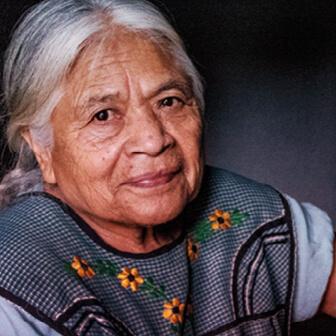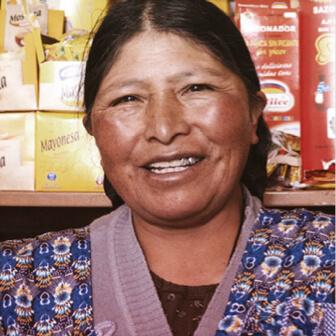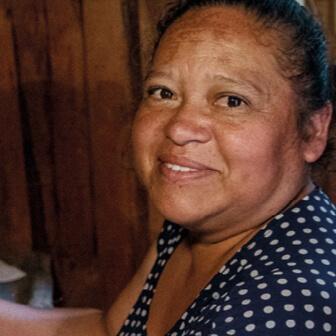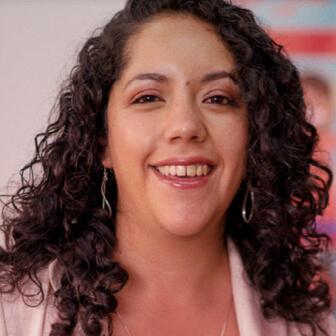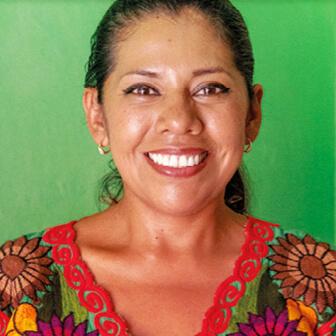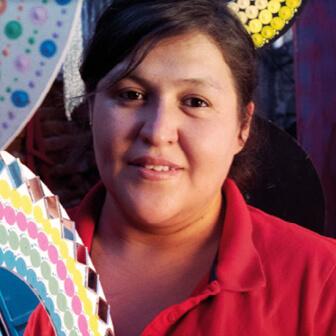Universidad del Pacífico Student María del Roció Shares her Experiences as an Intern at Pro Mujer in Peru
8 agosto, 2012
Blog, Partners, Voices from the Field
By Paola Fattorini, Communications Manager, Pro Mujer in Peru
Many of those that today hold key positions in public and private institutions graduated from the best universities and apply what they learned in school every day. Today, more than ever, information comes at us from all directions about economic growth and the development of our country. One must ask which leaders have developed the ability to connect with their communities, inspire others, and achieve the proposed development objectives.
With the goal of creating a space for the application of knowledge and practical learning oriented toward social development, Pro Mujer and Universidad del Pacífico in Peru launched a program in October 2011 that seeks to combine sustainability and human development.
María del Roció Ruíz Tafur is 22 years old and is the first student from Universidad del Pacífico to complete an internship through this program at our organization. She will graduate in December 2012 with a degree in Business Administration.
Paola Fattorini (PF): How did you choose Pro Mujer?
María: My university launched the “Responsible Leaders for the World” campaign, which highlights how graduates have a genuine impact on the development of the country. I saw the video featuring Naldi Delgado – the General Manager of Pro Mujer in Peru – and I was inspired by her story. I then went to speak with Ceclia Montes, Director of Institutional Relations at my university, and I told her that I wanted to complete my internship requirement at Pro Mujer in Peru. At this time, Pro Mujer was not on the list of private companies and development institutions that accept interns, but I insisted. So Cecilia contacted Naldi, and Naldi agreed to allow students from Universidad del Pacífico to intern with Pro Mujer. We hope this is the beginning of a mutually beneficial relationship.
Left, a client from Peru; Right, María on a visit to Huata, a village in the central region of Huaylas.
PF: What motivated you to complete your internship requirement with Pro Mujer?
María: I wanted to expand my knowledge and skills and share them with others. Also, my mother and grandmother had instilled a sense of social responsibility in me. Most importantly, I feel privileged to have received a good education, and I believe it is my responsibility to use the knowledge I have acquired to help others.
PF: Pro Mujer is not just a development institution for poor women. Since its beginning, it has committed itself to decentralization; its national office is in Puno. You knew that interning at Pro Mujer meant living in Puno, a city that still has a very high degree of inequality. What were your expectations?
María: For me it has been very valuable to live and work in Puno, because it’s important to do more than theorize. You have to have humility and develop it to be able to talk about what happens outside of Lima, and having an experience like this allows you to see beyond the world you know. You adapt your knowledge to diverse contexts, and you see how organizations work every day with cultural, traditional and faith-related issues, which have an influence on all the organization’s activities. I would like to add that when you intern in a city like Puno, and work with low-income women who, because they lack formal education, must sustain themselves through self-employment, you have a responsibility to do something to broaden their opportunities.
PF: What strengths did you find at Pro Mujer?
María: Pro Mujer has a very important role and it is unique among other organizations. Not only do they provide small loans to women who would otherwise lack access to opportunities to give their families a better future, but they are also working on improving the organization’s health services. The goal is that the health services will not only set Pro Mujer apart from its competitors, but that they will also serve as an essential ingredient in the development of women and their families. When I arrived, Pro Mujer was in the process of working to make its health services sustainable in order to reach more women and contribute to the reduction of chronic disease. One of the best things about the organization is its mission: to provide poor women in Latin America the means to build livelihoods for themselves and futures for their families through financial services, business training and healthcare. Another great thing about Pro Mujer is that it provides integrated services. It is not just a microfinance organization, but a women’s development institution, and through its integrated services, it addresses the key issues that affect the women it serves in southern Peru.
PF: During the months that you lived in Puno, aside from your internship, what other opportunities were provided to you?
María: I was invited to dance during the Celebration of the Virgin of Candelaria, which is the most important folkloric celebration in Peru. I am fascinated by the culture here in Puno. I loved dancing and it was an honor to learn about this rich mixture, this enigmatic combination of profound religiosity and boundless happiness, the concept of offerings, and this appreciation for the gifts of the earth and of the Virgin of Candelaria, who is venerated as a mother. This celebration shows you a microcosm of Peru where, although social and economic differences persist, people are still brought together by a common joy and appreciation. Furthermore, the celebration attracts tourists, which provides an excellent commercial opportunity.
María, left, poses with a fellow dancer at the Celebration of the Virgin of Candelaria.
PF: In what way has your experience as an intern contributed to your personal development?
María: Being in direct contact with the women, listening to their problems, their stories, and living in Puno has taught me to have a broader view of how each person defines their personal development. I am 22 years old, I am not a mother yet, and my personal concept of development is based on my professional development. On the other hand, I realize that for many women that is not the case, nor are they happy with their circumstances, and that not everyone has the same opportunities. Professionals who want to work in development have to respect different cultures and ways of thinking, and strategize to create opportunities for people based on what they value most, and that give them the chance to choose. For this reason, I like how Pro Mujer’s health program fosters a culture of prevention, providing clients with the best information so that they can decide what they need. There are also health personnel who not only provide information, but also treat the women with kindness and provide the most personal care possible, which builds clients’ trust, in a place where machismo is still a strong force, and where people still turn a blind eye toward violence against women.
PF: You graduate at the end of 2012 with a degree in Business Administration. What resources did you utilize through your internship?
María: My major prepares me to formulate plans, strategies, methodologies and procedures to help a company achieve its objectives, all with a focus on social responsibility. Pro Mujer’s mission is not only inspiring, but it has given me the opportunity to contribute directly to the inclusive development of the country. One of the benefits of the internship has been the opportunity to work with Professor Alejandro Flores, from the College of Business, who has experience in microfinance and is an expert in planning. I felt very privileged that a professor from my university could come all the way to Puno to monitor my progress, address my concerns, and contribute to Pro Mujer’s efforts to improve its health services and achieve sustainability. Under Professor Flores’s supervision, we are putting together a revolutionary proposal that promotes preventive care, healthy habits, and that contributes to the Pro Mujer’s strategy to combat chronic diseases that affect Latin American women, such as cervical and breast cancers, diabetes, hypertension and obesity.
PF: What did Professor Flores find during his visit that he had not considered before when he just communicated with you through Skype or by mail?
María: Like me, Professor Flores had the chance to see how the communal bank methodology works, how disbursement and repayment sessions are conducted, how it all contributes to the empowerment and participation of the women, and how it has helped Pro Mujer achieve sustainability. He was also able to speak with the health personnel, and he saw how cultural factors have a real impact on the success of a health-related development project. For example, he was interested to discover how sticking coca leaves to ones forehead can alleviate a headache. When he spoke with some of Pro Mujer’s clients from Juliaca, they told him how they had been treated poorly in hospitals and that the drugs they were given there hadn’t helped them, and for this reason they felt resistant to traditional medicine. As professionals it is important to consider this, and not try to change people’s approach, but rather to find aspects of both natural and traditional medicine that complement one another.
PF: What is the most valuable thing you learned from your time at Pro Mujer?
María: Working at Pro Mujer, living for several months in Puno and visiting Juliaca led me to reflect on certain things. For example, it is evident that there are levels of development and that there is some purchasing power, but the supply itself is disorganized, and doesn’t reflect equity of development. Everyone has the latest cell phones, but there are no traffic lights, the roads are unpaved, and people are honking their horns for no reason. Because of what I have learned at the Universidad del Pacífico and through my experience at Pro Mujer, I believe that it is possible to find a balance between economic and social development through civic values. Pro Mujer promotes values such as responsibility, punctuality, solidarity, respect, and healthy habits – these form the basis of the communal bank model and the package of integrated services that the organization provides.
María poses with a client at a Pro Mujer-sponsored International Women’s Day event where clients and staff participated in a hike led simultaneously in Puno, Juliaca and Tacna.
PF: What do you hope will come from this experience and from the agreement that was created between Universidad del Pacífico and Pro Mujer?
María: I hope to inspire students from diverse fields of study to get involved and develop strategies together that address cultural and traditional issues. I hope they see the opportunity to make a contribution outside of Lima, in a non-business field, and in this way enrich themselves – this is another challenge in itself, but it brings even greater satisfaction. At Universidad del Pacífico we get a very good education in planning, strategizing, and turning an idea into a business. Part of the proposal that Professor Flores and I worked on is aimed at strengthening the women’s businesses and introducing socially responsible business practices with regards to health and the environment, which is in line with Pro Mujer’s mission.
PF: What plans do you have for the future?
María: I would like to further my education by getting a more global experience. For this reason I plan to get an international masters degree. I love to travel, and I also feel that traveling complements learning because it brings us closer to other outlooks on life and other ways to solve problems.
